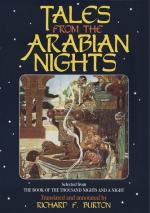[FN#98] Sit venia verbo: I have the less hesitation in making Adam anticipate the widow Malone from a profound conviction that some Hibernian antiquary, like Vallancey who found the Irish tongue in the Punic language of Plautus, shall distinctly prove that our first forefather spoke Keltic.
[FN#99] In text “Rih,” wind, gust (of temper), pride, rage. Amongst the Badawin it is the name given to rheumatism (gout being unknown), and all obscure aching diseases by no means confined to flatulence or distension. [The Ms. has: “ila an kata-ka ’l-’amal al-rabih,” which gives no sense whatever. Sir Richard reads: “katala-ka ’l-’amal al-rih,” and thus arrives at the above translation. I would simply drop a dot on the first letter of “kata-ka,” reading “fata-ka,” when the meaning of the line as it stands, would be: until the work that is profitable passed away from thee, i.e., until thou ceasedst to do good. The word “rabih” is not found in Dictionaries, but it is evidently an intensive of “rabih” (tijarah rabihah = a profitable traffic) and its root occurs in the Koran, ii. 15: “Fa-ma rabihat Tijaratuhum” = but their traffic has not been gainful.—St.]
[FN#100] Arab. “Badrah”: see vol. iv. 281. [According to Kamus, “Badrah is a purse of one thousand or ten thousand dirhams, or of seven thousand dinars. As lower down it is called “Badrat Zahab,” a purse of gold, I would take it here in the third sense.—St]
[FN#101] In text “Zardiya,” for “Zardiyyah” = a small mail coat, a light helmet.
[FN#102] Arab. “’Ind ’uzzati ’s-sinini” = lit. the thorny shrubs of ground bare of pasture.
[FN#103] This is another form of “inverted speech,” meaning the clean contrary; see vols. ii. 265; vi. 262; and vii. 179.
[FN#104] In text “Lam yakthir Khayrak”; this phrase (pronounced “Kattir Khayrak”) is the Egyptian (and Moslem) equivalent for our “thank you.” Vols. iv. 6; v. 171. Scott (p. 267) make Al-Hajjaj end with, “Cursed is he who doth not requite a sincere adviser, declareth our sacred Koran.”
[FN#105] In the W.M. Ms. this tale is followed by the “History of Uns al-Wujud and the Wazir’s daughter Rose-in-hood,” for which see vol. v. 32 et seq. Then comes the long romance “Mazin of Khorasan,” which is a replica of “Hasan of Bassorah and the King’s daughter of the Jinn” (vol. vii. 7). I have noted (vol. x. 75) that this story shows us the process of transition from the Persian original to the Arabic copy. “Mazin” is also the P.N. of an Arab tribe: De Sacy, Chrest. i. 406.
[FN#106] Ms. vol. v. pp. 92-94: Scott, vol. vi. 343: Gauttier, vi. 376. The story is a replica of the Mock Caliph (vol. iv. 130) and the Tale of the First Lunatic (Suppl. vol. iv.); but I have retained it on account of the peculiar freshness and naivete of treatment which distinguishes it, also as a specimen of how extensively editors and scriveners can vary the same subject.




